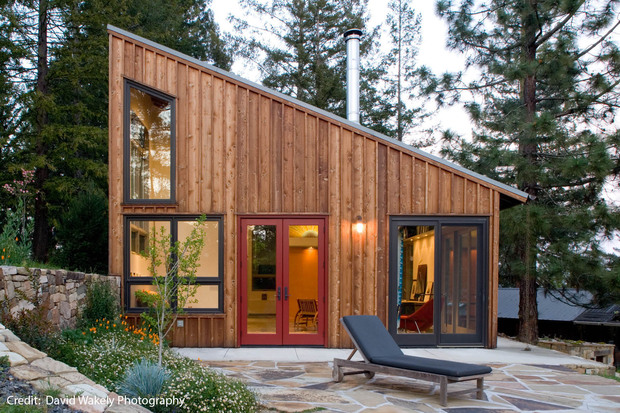Wednesday, August 28, 2019
New research reveals that a growing number of residential customers are prioritizing zero net energy (ZNE) homes and are willing to pay more to achieve ZNE status. The findings are part of a study commissioned by the Propane Education & Research Council (PERC) and conducted by the research firm Harris Insights & Analytics LLC. For the purpose of the survey, a ZNE home was defined as one that produces as much energy as it uses to those polled.
 “The study revealed some really interesting data and we were excited to see that the majority of respondents expressed an interest in energy-efficient and ZNE home products,” said Bryan Cordill, director of residential and commercial business development at PERC. “These insights can help guide construction professionals looking to grow their customer base in this emerging home-building approach.”
“The study revealed some really interesting data and we were excited to see that the majority of respondents expressed an interest in energy-efficient and ZNE home products,” said Bryan Cordill, director of residential and commercial business development at PERC. “These insights can help guide construction professionals looking to grow their customer base in this emerging home-building approach.”
The survey reached 2200 U.S. residents who were self-described as soon to be purchasing, remodeling, or building a home. Of those surveyed, 1000 expected to purchase a home in the next two years (buyers), another 1000 expected to remodel one or more rooms in their home in the next two years (remodelers), and 200 were likely to build a home in the next couple years (builders). In addition to the 2200 polled, 200 construction professionals also provided input.
Notable findings from the survey include: favorability of ZNE homes is nearly unanimous with 98% of builders, 95% of buyers, and 89% of remodelers being at least somewhat favorable. Eighty-three percent of buyers and 89% of builders said they were likely to consider a ZNE home for their next home purchase or build. Cost savings and environmental benefits were the most commonly cited reasons why buyers and builders were considering a ZNE home.
In addition, 84% of builders and 81% of remodelers stated a willingness to pay more for a ZNE home. On average, respondents said they were willing to pay between 20% and 30% more. Construction professionals estimate, on average, it would cost 36% more for a home to meet ZNE standards compared to a traditional home.
The study also showed that construction professionals are optimistic about the future demand for ZNE residences. In fact, nearly nine in 10 forecast demand to increase over the next five to 20 years. Notably, close to four in 10 expect demand will rise significantly, represent- ing a 153% increase over those who said demand had increased significantly over the past couple of years.
“As this trend continues to grow, it’s important for construction professionals to educate themselves, and their customers, on how a home’s energy systems and appliances affect the overall efficiency of a home—and its ZNE status,” Cordill said. “Propane provides a whole-home energy solution and construction professionals who use propane can set themselves apart in the market.” For more information on how home propane systems can achieve ZNE status, visit Propane.com.
 “The study revealed some really interesting data and we were excited to see that the majority of respondents expressed an interest in energy-efficient and ZNE home products,” said Bryan Cordill, director of residential and commercial business development at PERC. “These insights can help guide construction professionals looking to grow their customer base in this emerging home-building approach.”
“The study revealed some really interesting data and we were excited to see that the majority of respondents expressed an interest in energy-efficient and ZNE home products,” said Bryan Cordill, director of residential and commercial business development at PERC. “These insights can help guide construction professionals looking to grow their customer base in this emerging home-building approach.”The survey reached 2200 U.S. residents who were self-described as soon to be purchasing, remodeling, or building a home. Of those surveyed, 1000 expected to purchase a home in the next two years (buyers), another 1000 expected to remodel one or more rooms in their home in the next two years (remodelers), and 200 were likely to build a home in the next couple years (builders). In addition to the 2200 polled, 200 construction professionals also provided input.
Notable findings from the survey include: favorability of ZNE homes is nearly unanimous with 98% of builders, 95% of buyers, and 89% of remodelers being at least somewhat favorable. Eighty-three percent of buyers and 89% of builders said they were likely to consider a ZNE home for their next home purchase or build. Cost savings and environmental benefits were the most commonly cited reasons why buyers and builders were considering a ZNE home.
In addition, 84% of builders and 81% of remodelers stated a willingness to pay more for a ZNE home. On average, respondents said they were willing to pay between 20% and 30% more. Construction professionals estimate, on average, it would cost 36% more for a home to meet ZNE standards compared to a traditional home.
The study also showed that construction professionals are optimistic about the future demand for ZNE residences. In fact, nearly nine in 10 forecast demand to increase over the next five to 20 years. Notably, close to four in 10 expect demand will rise significantly, represent- ing a 153% increase over those who said demand had increased significantly over the past couple of years.
“As this trend continues to grow, it’s important for construction professionals to educate themselves, and their customers, on how a home’s energy systems and appliances affect the overall efficiency of a home—and its ZNE status,” Cordill said. “Propane provides a whole-home energy solution and construction professionals who use propane can set themselves apart in the market.” For more information on how home propane systems can achieve ZNE status, visit Propane.com.

